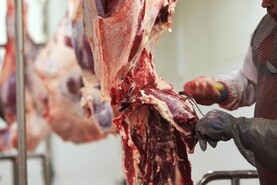The recent rainfall in Newford Farm, the 100-cow suckler-to-beef herd in Athenry, Co Galway, has resulted in all cows,calves and yearling steers being rehoused.
Ground conditions deteriorated sharply, with 120mm of rainfall from the start of the month up to 14 March.
Further heavy rainfall is forecast on Saturday, but a brighter forecast for the rest of the week will hopefully open up an opportunity to get some stock back outdoors in the coming 10 days.
Calving progress
Calving is progressing steadily, with 90 cows calved to Friday within a six-week period. There are 20 cows left to calve including seven replacement heifers.
There are 87 live calves on the ground, with three sets of twins and five cases of calf mortality.
Four of these calves died around calving and the other was a calf which contracted pneumonia outdoors.
Health focus
The first calves born in February received vaccination for coccidiosis, blackleg and pneumonia and are dehorned, meaning that if weather does improve, these animals will be primed for immediate turnout.

Calves can access the creep area by a simple creep gate secured to a partially opened feed barrier.
The rehoused cows and calves are being housed in the converted sheep shed, which has a feed passage on both sides of a central slatted area. This has allowed one feeding passage to be converted into a creep area, with calves gaining access to a simple creep area.
Rehousing has also upped the focus on hygiene
Calves are also being offered a small volume of creep feed in a trough, with this practice working well in 2018 in getting calves trained into eating meal.
Michael Fagan of Teagasc says the temporary creep area is working well in significantly cutting down on the pressure for space in straw-bedded sheds, along with lowering straw usage.
Hygiene
Rehousing has also upped the focus on hygiene, with the temporary calf creep bedded regularly, while slats are being scraped down daily with lime applied to reduce the risk of mastitis.
Despite the extra attention, one cow contracted E coli mastitis last week, but was identified quickly and is responding well to treatment.
There is also close attention being paid to hygiene in calving pens, with all steps taken to reduce the risk of disease establishing. Regular disinfection is taking place, with footbaths present at the entrance to each shed.
A batch of 16 cows, which are lower in condition, have been grouped together on straw bedding and are receiving 2kg concentrate supplementation to underpin condition.
These cows will be prioritised for turnout and may be retained in a group for a short period for preferential treatment if required.
Yearling management
Steers have been rehoused and are being fed ad-lib silage.
Heifers remain at grass on dry rented ground. They are grazing off heavy covers before reseeding takes place and, weather-dependent, have in the region of two weeks grazing remaining. They will then hopefully return to the Gort Na Habhainn block.
The recent rainfall in Newford Farm, the 100-cow suckler-to-beef herd in Athenry, Co Galway, has resulted in all cows,calves and yearling steers being rehoused.
Ground conditions deteriorated sharply, with 120mm of rainfall from the start of the month up to 14 March.
Further heavy rainfall is forecast on Saturday, but a brighter forecast for the rest of the week will hopefully open up an opportunity to get some stock back outdoors in the coming 10 days.
Calving progress
Calving is progressing steadily, with 90 cows calved to Friday within a six-week period. There are 20 cows left to calve including seven replacement heifers.
There are 87 live calves on the ground, with three sets of twins and five cases of calf mortality.
Four of these calves died around calving and the other was a calf which contracted pneumonia outdoors.
Health focus
The first calves born in February received vaccination for coccidiosis, blackleg and pneumonia and are dehorned, meaning that if weather does improve, these animals will be primed for immediate turnout.

Calves can access the creep area by a simple creep gate secured to a partially opened feed barrier.
The rehoused cows and calves are being housed in the converted sheep shed, which has a feed passage on both sides of a central slatted area. This has allowed one feeding passage to be converted into a creep area, with calves gaining access to a simple creep area.
Rehousing has also upped the focus on hygiene
Calves are also being offered a small volume of creep feed in a trough, with this practice working well in 2018 in getting calves trained into eating meal.
Michael Fagan of Teagasc says the temporary creep area is working well in significantly cutting down on the pressure for space in straw-bedded sheds, along with lowering straw usage.
Hygiene
Rehousing has also upped the focus on hygiene, with the temporary calf creep bedded regularly, while slats are being scraped down daily with lime applied to reduce the risk of mastitis.
Despite the extra attention, one cow contracted E coli mastitis last week, but was identified quickly and is responding well to treatment.
There is also close attention being paid to hygiene in calving pens, with all steps taken to reduce the risk of disease establishing. Regular disinfection is taking place, with footbaths present at the entrance to each shed.
A batch of 16 cows, which are lower in condition, have been grouped together on straw bedding and are receiving 2kg concentrate supplementation to underpin condition.
These cows will be prioritised for turnout and may be retained in a group for a short period for preferential treatment if required.
Yearling management
Steers have been rehoused and are being fed ad-lib silage.
Heifers remain at grass on dry rented ground. They are grazing off heavy covers before reseeding takes place and, weather-dependent, have in the region of two weeks grazing remaining. They will then hopefully return to the Gort Na Habhainn block.







 This is a subscriber-only article
This is a subscriber-only article










SHARING OPTIONS: